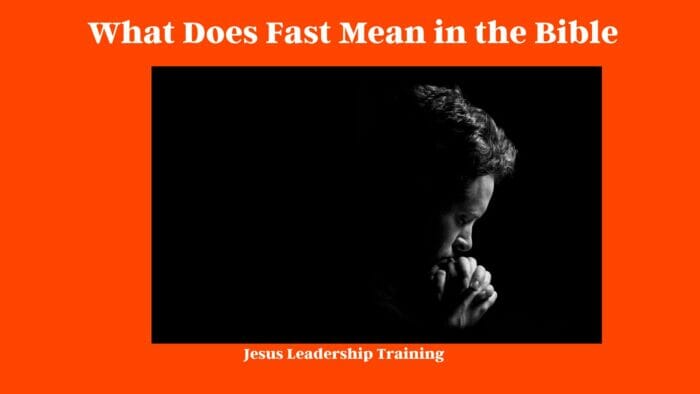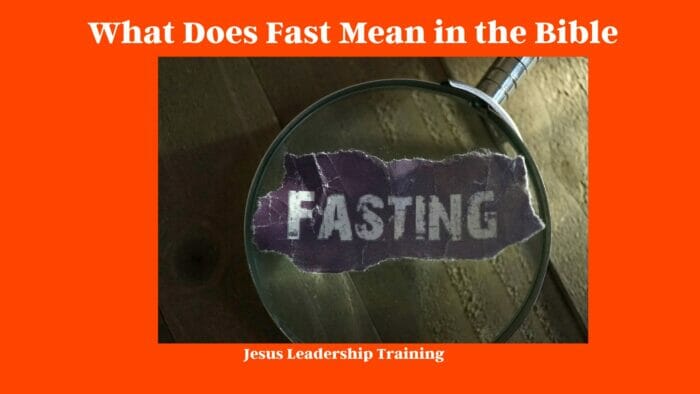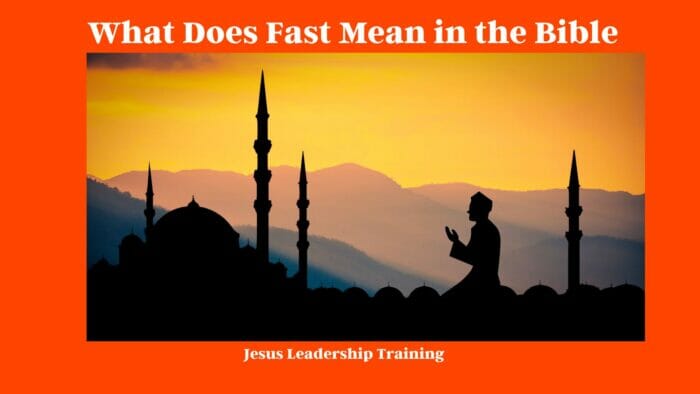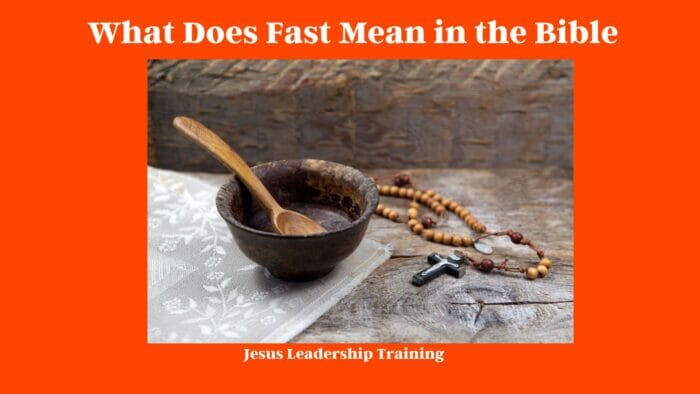What Does Fast Mean in the Bible – In the Bible, “fast” typically refers to abstaining from food and drink as a spiritual discipline, often for a specific purpose. It demonstrates humility, self-control, and submission to God, as well as deepening one’s relationship with Him. Fasting can serve various purposes such as seeking guidance, expressing repentance, or interceding for others. Biblical examples include Moses, Esther, and Jesus, who all fasted during significant moments in their lives.
Table of Contents
What Does Fast Mean in the Bible
Fasting has been a common practice across different religions and cultures for centuries. In Christianity, fasting is regarded as an important spiritual discipline that helps believers to draw closer to God. The concept of fasting is mentioned numerous times in the Bible, but what does fast mean in the Bible exactly? In this article, we’ll explore the meaning of fasting in the Bible, its significance, and how it is practiced by Christians today.
Understanding Fasting in the Bible
In the Bible, fasting is defined as the act of abstaining from food or drink for a certain period of time, usually for spiritual purposes. Fasting can be an individual or collective act of devotion and is often associated with prayer and repentance. In the Old Testament, fasting was often practiced as a sign of mourning, repentance, or as a way of seeking God’s intervention in difficult circumstances. In the New Testament, fasting is mentioned in connection with Jesus’ teachings and his own practice of fasting.

Significance of Fasting in the Bible
Fasting is regarded as an important spiritual discipline in the Bible, and it is often associated with repentance, humility, and seeking God’s guidance. The act of fasting is seen as a way of demonstrating one’s devotion to God and acknowledging his sovereignty. In the Bible, fasting is also associated with various benefits, such as spiritual growth, purification, and physical and emotional healing.
Different Types of Fasting in the Bible
There are different types of fasting mentioned in the Bible, and each has its own purpose and significance. Here are some of the most common types of fasting mentioned in the Bible:
- Absolute Fast: This involves abstaining from both food and water for a certain period of time. This type of fast is rare and is only practiced in extreme circumstances.
- Partial Fast: This involves abstaining from certain types of food or drink for a certain period of time. For example, a person may choose to fast from meat or alcohol.
- Intermittent Fast: This involves fasting for a certain period of time each day or each week. For example, a person may choose to fast from dawn to dusk each day or to fast for one day a week.
- Absolute Fast with Exceptions: This involves abstaining from all food and drink except for water. This type of fast is often practiced for short periods of time.
How Fasting is Practiced Today
Fasting is still practiced by Christians today, and there are different ways in which it is observed. Some Christians choose to fast for a specific period of time, such as during the season of Lent or as part of a spiritual retreat. Others may choose to fast as a way of seeking God’s guidance in a particular area of their life. Fasting can also be practiced in different ways, such as abstaining from food or drink, or from certain activities or pleasures.
Table on the Spiritual Benefits of Fasting
| Benefit | Description |
|---|---|
| Spiritual Discipline | Fasting can serve as a practice of self-discipline and self-control, virtues emphasized in the Bible (Galatians 5:22-23). It can help break dependencies and can clear the mind, enabling a closer focus on God. |
| Humility | Fasting can be an act of humility before God, recognizing our dependence on Him. In fasting, we acknowledge that man does not live on bread alone, but on every word that comes from the mouth of the Lord (Deuteronomy 8:3). |
| Repentance | Fasting is often associated with repentance in the Bible. It can symbolize a sincere heart response to the recognition of sin, leading to confession and change (Jonah 3:5-10). |
| Intercession | Fasting can accompany earnest prayer and intercession. In difficult times or when making major decisions, Christians may fast as part of their prayers, seeking God’s guidance and intervention (Esther 4:16). |
| Worship and Devotion | Fasting can be an act of worship and devotion to God. It can demonstrate a heart that seeks God first, prioritizing spiritual matters over physical needs (Acts 13:2). |
| Sensitivity to God’s Spirit | Fasting can heighten a believer’s spiritual sensitivity, making them more attentive to God’s spirit and prompting. It can help one discern God’s will more clearly (Acts 13:2-3). |
| Expectation of God’s Action | Fasting can foster a sense of expectancy for God to move or act in response to prayer and fasting. It can represent a deep, earnest seeking of God’s help and intervention. |
| Health and Wholeness | While primarily spiritual, the benefits of fasting can extend to physical and mental health. This can include heightened alertness, detoxification, and even healing, complementing a holistic understanding of spirituality. |
Please note that fasting should be approached with caution and wisdom. It’s not recommended for everyone, particularly those with certain health conditions. Always consult with a health professional before beginning a fast.
The practice of fasting has been a spiritual practice for centuries. Many religions throughout history have incorporated fasting into their worship and spiritual practices. Fasting is a way for people to draw closer to God and to seek His guidance and presence in their lives. It is an act of obedience and an expression of faith.
The Bible encourages us to fast and the practice of fasting is found in the Old and New Testaments. In the Old Testament, God commands His people to fast and even instructs them on the purpose, duration and type of fast. In the New Testament, Jesus sets an example of fasting and His disciples continue the practice. Throughout the Bible, fasting is presented as a powerful spiritual tool that many believers have used to seek God’s will and to be obedient to His commands.
In this blog, we will explore the biblical teachings on fasting and look at practical ways to practice fasting according to the Bible. We will look at what the Bible says about fasting, how to incorporate fasting into our lives, and the spiritual benefits of fasting. We will also look at how to use fasting as a way to draw closer to God and to seek His guidance and presence in our lives.

Religious Faiths that Practice Fasting Today
- Christianity: Fasting during Lent, Advent, and other specific periods or days.
- Islam: Fasting during Ramadan, and on other special days like Ashura and Arafat.
- Judaism: Fasting on Yom Kippur, Tisha B’Av, and other designated fast days.
- Buddhism: Fasting on Uposatha days, during Vassa, and as part of meditation retreats.
- Hinduism: Fasting on Ekadashi, Navratri, and other auspicious days or festivals.
- Jainism: Fasting during Paryushana, Aymbil, and other periods of spiritual observance.
- Sikhism: Some Sikhs observe fasting on specific days or in times of personal reflection.
- Baha’i Faith: Fasting during the annual 19-day period of the Baha’i Fast.
- Latter-Day Saints: Fasting on the first Sunday of each month, known as Fast Sunday.
Fast Fasting: A Biblical Guide
The Bible provides clear guidance on the practice of fasting. In the Old Testament, God commanded the Israelites to fast on certain occasions and even gave them instructions on the type and duration of their fast. In the New Testament, Jesus sets an example of fasting and His disciples continue the practice.
In the Bible, fasting is presented as a powerful spiritual tool that many believers have used to seek God’s will and to be obedient to His commands. Fasting is also a way to humble ourselves before God, to draw closer to Him, and to express our faith.
When fasting, we should be intentional and purposeful. We should set aside time and space to focus on God and His Word. We should also focus on prayer and bible study and use fasting as a way to enhance our spiritual growth and development.

Seek God in Prayer and Fasting
Prayer is an essential part of fasting. As we fast, we should be seeking God’s will and guidance. We should be asking God to reveal His plan for our lives and to give us wisdom and direction. We should also be praying for our needs and for others.
Fasting is a time to draw closer to God and to seek His presence. We should be praying for His protection and blessing, and asking Him to fill us with His Spirit. We should also be asking Him to give us strength and courage to follow His will.
Finding Strength Through Fasting in Jesus
Fasting is a time to focus on Jesus and to draw closer to Him. We should be seeking His strength and comfort in our times of need. Jesus has promised to be with us always and to never leave us or forsake us. He has promised that if we seek Him, we will find Him.
As we fast, we should be asking Jesus to fill us with His Spirit and to give us the strength to do His will. We should be asking Him to guide us and to help us find our way. We should also be praising Him for His goodness and grace.
Practical Ways to Fast According to the Bible
The Bible provides guidance on how to fast. We should be purposeful and intentional in our fasting. We should set aside time and space to focus on God and His Word. We should also use fasting as a way to enhance our spiritual growth and development.
When fasting, we should be abstaining from all food and drink, except for water. We should also be abstaining from all activities and pleasures that distract us from our focus on God. We should be setting aside time for prayer and bible study.
List of 10 Precautions for Religious Fasting
- Consult a healthcare professional: Seek advice if you have medical conditions or concerns.
- Hydration: Ensure proper fluid intake during non-fasting hours to prevent dehydration.
- Balanced diet: Consume nutrient-rich, balanced meals during permissible eating periods.
- Gradual transition: Ease into fasting by gradually reducing portion sizes and meal frequency.
- Monitor health: Pay attention to physical and mental well-being throughout the fast.
- Adjust physical activity: Modify exercise routines to match energy levels during fasting.
- Break the fast gently: Avoid overeating or consuming heavy, greasy foods when breaking the fast.
- Rest and sleep: Prioritize sufficient sleep and rest to support the body’s recovery.
- Listen to your body: Break the fast if experiencing severe discomfort, illness, or weakness.
- Spiritual focus: Maintain a strong spiritual focus to stay motivated and gain benefits from fasting.
Inviting the Holy Spirit Through Prayer and Fasting
Prayer is an essential part of fasting. As we fast, we should be inviting the Holy Spirit to fill us and to guide us. We should be asking the Holy Spirit to give us wisdom and discernment as we seek God’s direction. We should also be asking Him to fill us with His power and to help us serve God faithfully.
A Study of Bible Verses on Fasting
The Bible provides many verses on fasting. We should be studying these verses and applying them to our own lives. We should be asking God to help us understand the verses and to help us apply them to our lives.
The Bible provides many examples of how to fast and what the benefits of fasting are. We should be looking to these examples to help us in our own fasting practices.
Fasting: A Time for Devotion to God
Fasting is a time for us to devote ourselves to God and to seek His will. We should be setting aside time for prayer, bible study, and meditation. We should also be seeking God’s direction and guidance in our lives.
Fasting should be seen as a time of spiritual renewal. We should be seeking God’s presence and asking Him to fill us with His Spirit. We should also be asking Him to give us strength and courage to follow His will.
Exercising Faith Through Prayer and Fasting
Prayer is an essential part of fasting. As we fast, we should be exercising our faith and trusting God to answer our prayers. We should be asking God to give us wisdom, discernment, and direction. We should also be asking Him to help us trust Him and to have faith in His promises.
Fasting and Bible Study: How to Strengthen Your Faith
Fasting and bible study go hand in hand. As we fast, we should be studying God’s Word and seeking to understand His will. We should be asking God to fill us with His Spirit and to help us apply His Word to our lives.
We should also be asking God to help us understand the scriptures and to help us grow in our faith. We should be seeking to deepen our relationship with God and to strengthen our faith in Him.
Learning to Discern God’s Will Through Fasting
Fasting is a time for seeking God’s will and guidance in our lives. We should be asking God to help us discern His will and to help us understand His purpose for our lives. We should also be praying for wisdom and discernment as we seek God’s direction.
Fasting and Bible Reading: A Spiritual Renewal
Fasting and bible reading go hand in hand. As we fast, we should be reading God’s Word and seeking to understand His will. We should be asking God to fill us with His Spirit and to help us apply His Word to our lives.
We should also be asking God to help us understand the scriptures and to help us grow in our faith. We should be seeking to deepen our relationship with God and to experience spiritual renewal.
Fasting and Seeking God’s Direction
As we fast, we should be seeking God’s direction in our lives. We should be asking God to give us wisdom and discernment as we seek His will. We should also be asking Him to guide us in our decisions and to lead us in His paths.
Understanding the Power of Fasting in the Bible
The Bible provides many examples of the power of fasting. We should be studying these examples and looking to them for guidance. We should be asking God to help us understand the power of fasting and to help us apply it to our own lives.
How to Practice Fasting and Prayer Time
Fasting and prayer should go hand in hand. As we fast, we should be setting aside time for prayer and bible study. We should be asking God to fill us with His Spirit and to help us seek His guidance and direction. We should also be asking Him to help us understand His will and to lead us in His paths.
Utilizing Fasting for Spiritual Growth
Fasting is a powerful tool for spiritual growth. As we fast, we should be seeking spiritual renewal and drawing closer to God. We should be asking God to fill us with His Spirit and to help us grow in our faith. We should also be asking Him to help us understand His will and to lead us in His paths.
Finding Peace and Comfort Through Fasting
Fasting is a time for seeking God’s peace and comfort. We should be asking God to fill us with His Spirit and to give us rest. We should also be asking Him to help us find our way and to help us understand His will.
Fasting for Victory and Overcoming Challenges
Fasting can be a powerful tool for victory and overcoming challenges. We should be asking God to fill us with His strength and to help us persevere. We should also be asking Him to give us wisdom and to help us find our way.
FAQs about Fasting in the Bible
- What is the Purpose of Fasting in the Bible? Fasting is seen as an important spiritual discipline that helps believers to draw closer to God, demonstrate their devotion, and seek his guidance.
- How Long Should You Fast in the Bible? The Bible does not prescribe a specific duration for fasting, and it is up to the individual to decide how long to fast.
- Can You Drink Water When Fasting in the Bible? This depends on the type of fast you are observing. In an absolute fast, water is also abstained from. In other types of fasts, such as the absolute fast with exceptions, water is allowed.
- What are the Benefits of Fasting in the Bible? Fasting is associated with various benefits, such as spiritual growth, purification,
physical and emotional healing, and seeking God’s intervention in difficult circumstances.
- Is Fasting Required in the Bible? Fasting is not required in the Bible, but it is regarded as an important spiritual discipline that can help believers to deepen their relationship with God.
- Can Fasting be Harmful? Fasting can be harmful if not done correctly or for prolonged periods of time. It is important to consult with a healthcare professional before embarking on a fast, especially if you have any underlying health conditions.
Final Thoughts – What is the Meaning of Fasting
Fasting is an important spiritual discipline in Christianity, and its practice can help believers to draw closer to God and seek his guidance. The concept of fasting in the Bible involves abstaining from food or drink for a certain period of time and is often associated with prayer, repentance, and seeking God’s intervention. There are different types of fasting mentioned in the Bible, each with its own purpose and significance. Fasting can still be practiced by Christians today, and it is important to approach it with wisdom, discernment, and seeking guidance from God.
If you are considering fasting or any other spiritual discipline, it is important to seek guidance from a trusted spiritual leader and healthcare professional. Understanding the meaning and significance of fasting in the Bible can help you to approach it with a deeper understanding of its purpose and benefits.




